Best films, sorted by revenue
Do not worry about movies without interests that nobody ever heard of, and focus on the best films! Here are the top films to see :
Filter by countries
Filter by genre
Filter by decade
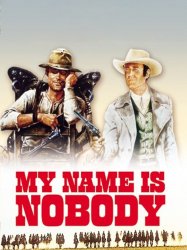
My Name Is Nobody (1973)
, 1h57Directed by Tonino Valerii, Sergio Leone
Origin Italie
Genres Comedy, Western, Spaghetti Western
Themes Buddy films
Actors Terence Hill, Henry Fonda, Jean Martin, Geoffrey Lewis, Mario Brega, Steve Kanaly
Jack Beauregard (Henry Fonda) is an aging legendary gunslinger who wants to retire in peace in Europe to get away from young gunmen constantly trying to test themselves against the master. The film opens with three gunmen attempting to ambush Beauregard in a barbershop. After Beauregard has dispatched them, the barber's son asks his father if there is anyone in the world faster than Beauregard, to which the barber replies "Faster than him? Nobody!"
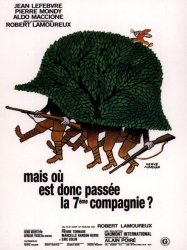 , 1h35
, 1h35Directed by Robert Lamoureux
Origin France
Genres War, Comedy, Action
Themes Military humor in film, Transport films, Aviation films, Histoire de France, L'Occupation allemande en France
Actors Pierre Mondy, Jean Lefebvre, Aldo Maccione, Robert Lamoureux, Pierre Tornade, Marcelle Ranson-Hervé
During the Battle of France, while the German forces are rapidly spreading across the country, the 7th Transmission Company suffers an air raid near the Machecoul wood, but survive and hide in the wood. Captain Dumont, the company commander, sends three of his men—Louis Chaudard, Pithiviers and Tassin—to scout the area. After burying the radio cable beneath a sandy road, the little squad crosses the field, climbs a nearby hill, and takes position within a wall-covered area, which happens to be a cemetery. One of the men who was cutting down trees for camouflage hits the wrong tree, pulling up the radio cable from the sandy road and revealing it to the passing German infantry. The Germans cut the cable, surround the woods, and order a puzzled 7th Company to surrender. During that time, Chaudard and his friends, who spotted the Germans, try without success (due to the cut cable) to contact and join their unit. They can only witness their comrades' capture and decide to run away.
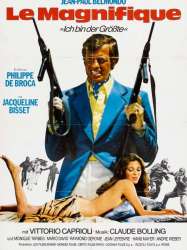
The Magnificent One (1973)
, 1h35Directed by Philippe de Broca
Origin France
Genres Comedy, Romantic comedy, Action, Adventure, Romance
Themes Films about writers, Spy films
Actors Jean-Paul Belmondo, Jacqueline Bisset, Vittorio Caprioli, Hans Meyer, Monique Tarbès, Mario David
François Merlin (Belmondo) is a Jean Bruce type writer of pulp espionage novels (he has written 42 so far) and about half of the film plays in his imagination, where he is the world-renowned superspy "Bob Sinclar" (The name of the character is never seen written in the movie, while some people write his name "Saint-Clar" the way it is pronounced in French sounds like Sinclar.)

The Inheritor (1973)
, 1h52Directed by Alain Payet, Bernard Queysanne, Philippe Labro
Origin France
Genres Drama, Thriller, Action, Crime
Actors Jean-Paul Belmondo, Carla Gravina, Charles Denner, Jean Rochefort, Jean Desailly, Jean Martin
Hugo Cordell, grand patron de la presse et de l'industrie, trouve la mort dans l'explosion de son avion, entre Genève et Paris. L'examen des débris de l'appareil ne permet pas d'établir avec certitude les causes de l'accident.
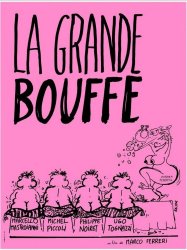
La Grande Bouffe (1973)
, 2h10Directed by Marco Ferreri, Rémy Duchemin
Origin France
Genres Drama, Comedy, Comedy-drama
Themes Cooking films, Films about sexuality, Films about suicide, Erotic films, Films about prostitution, Erotic thriller films
Actors Marcello Mastroianni, Ugo Tognazzi, Michel Piccoli, Philippe Noiret, Andréa Ferréol, Monique Chaumette
The film tells the story of four friends who gather in a villa for the weekend with the express purpose of eating themselves to death. Bouffer is French slang for "excessive eating". (the Italian abbuffata means "great eating").
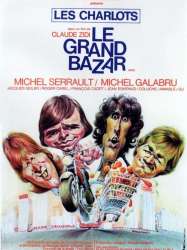
The Big Store (1973)
, 1h20Directed by Claude Zidi, Denys Granier-Deferre
Origin France
Genres Comedy
Themes La banlieue française, Films about the labor movement
Actors Gérard Rinaldi, Jean-Guy Fechner, Michel Galabru, Michel Serrault, Jean Sarrus, Gérard Filippelli
Jean, Phil, Gérard et Jean-Guy sont quatre copains qui habitent la même barre HLM. Ils préfèrent davantage boire un coup au bistrot d'Émile que d'aller travailler à l'usine de tondeuse à gazon. Ils ne tardent pas à se faire renvoyer à cause de leur manque de professionnalisme. Émile les aide à retrouver de petits boulots : Gérard fait visiter des appartements, Jean livre le lait, Jean-Guy répare une voiture et Phil distribue des tracts. Mais lorsque le commerce d'Émile est menacé par l'ouverture d'Euromarché situé en face, les quatre amis vont tout faire pour l'aider...
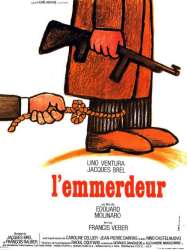
A Pain in the Ass (1973)
, 1h20Directed by Édouard Molinaro
Origin France
Genres Comedy, Crime
Themes Théâtre, Films based on plays, Buddy films
Actors Lino Ventura, Jacques Brel, Caroline Cellier, Nino Castelnuovo, Jean-Pierre Darras, Jacques Galland
Ralph Milan is a contract killer who is paid to kill Louis Randoni, whose testimony in various trials could harm the organisation. Ralph waits for his prey in his hotel room, but is interrupted by his comical neighbour, a shirt salesman named François Pignon (Jacques Brel). Pignon, who is suicidal since his wife left him for a reputed doctor named Fuchs (Jean-Pierre Darras), tries to hang himself on the waterpipes, but only manages to cause a flood. Realizing that if Pignon tries to kill himself again the police will search the place, Milan offers to talk him out of it until after his assassination. Unfortunately Pignon starts irritating him more, and makes it more difficult for him to fulfill his contract killing.
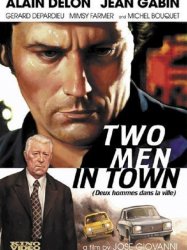
Two Men in Town (1973)
, 1h40Directed by José Giovanni
Origin France
Genres Drama, Crime
Themes Prison films, Films about capital punishment
Actors Jean Gabin, Alain Delon, Michel Bouquet, Mimsy Farmer, Victor Lanoux, Ilaria Occhini
After an early release from prison in 1952, an ex-safe cracker finds honest work and a new love. But when a vengeful cop begins to stalk him, and his ex-gang tries to lure him back, his determination to go straight is pushed to the breaking point.
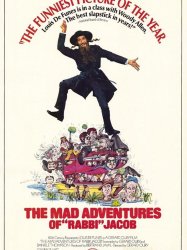 , 1h31
, 1h31Directed by Gérard Oury
Origin France
Genres Comedy, Adventure
Themes Films about racism, Films about religion, Films about Jews and Judaism
Actors Louis de Funès, Claude Giraud, Suzy Delair, Marcel Dalio, Claude Piéplu, Henri Guybet
Rabbi Jacob (Marcel Dalio) is one of the most loved rabbis of New York. One day, the French side of his family, the Schmolls, invite him to celebrate the bar mitzvah of the young David. Rabbi Jacob boards a plane to leave America for his birthland of France after more than 30 years of American life. His young friend Rabbi Samuel comes with him.
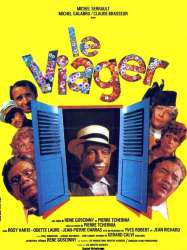
The Annuity (1972)
, 1h38Directed by Pierre Tchernia
Origin France
Genres Thriller, Comedy
Themes Films about families, La provence, Vieillesse
Actors Michel Serrault, Michel Galabru, Claude Brasseur, Rosy Varte, Jean-Pierre Darras, Odette Laure
En 1930 à Paris, Léon Galipeau, médecin généraliste à la compétence discutable, ausculte Louis Martinet, célibataire de 59 ans. Persuadé que son patient, usé, n'a que deux ans tout au plus à vivre, Galipeau convainc son frère Émile d'acquérir en viager la maison de campagne que possède Martinet dans un petit village de pêcheurs alors méconnu : Saint-Tropez. Confiants dans leur affaire, les deux frères acceptent même d'indexer la rente viagère sur le cours d'une valeur, pensent-ils, sans avenir : l'aluminium.
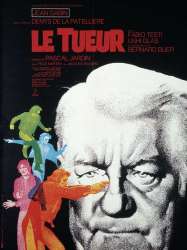
Killer (1972)
, 1h25Directed by Denys de La Patellière, Bernard Stora, Thierry Chabert
Origin France
Genres Drama, Thriller, Crime
Themes La provence
Actors Jean Gabin, Fabio Testi, Bernard Blier, Uschi Glas, Ginette Garcin, Félix Marten
Le commissaire divisionnaire Le Guen, qui a réussi à arrêter le tueur Georges Gassot, se heurte aux méthodes plus modernes de François Tellier, nouveau directeur de la P.J. Gassot s'enfuit de l'hôpital psychiatrique à destination de Marseille où il rencontre une jeune prostituée allemande Gerda. Mais Le Guen, par l'intermédiaire d'un journaliste, fait croire au Milieu que Gassot est à Marseille pour se mettre à la tête de leurs affaires ; le meurtre du souteneur de Gerda, à Marseille, et celui du passeur de Gassot à Marseille laissent croire à cette version. Gassot remonte à Paris, suivi par Le Guen.
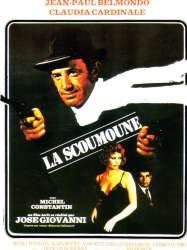
The Pariah (1972)
, 1h45Directed by José Giovanni
Origin France
Genres Drama, Crime
Themes Prison films, La provence, Gangster films
Actors Jean-Paul Belmondo, Michel Constantin, Claudia Cardinale, Andréa Ferréol, Philippe Brizard, Alain Mottet
Marseille, 1934. Xavier Saratov est en prison pour un meurtre que Jeannot Villanova, le patron de la pègre marseillaise, lui a fait endosser en mettant un cadavre dans sa voiture. Georgia, sa sœur, et son ami Roberto Borgo, surnommé « la Scoumoune » parce qu'il porte malheur à ses ennemis en dégainant et en tirant plus vite qu'eux, tentent de prouver son innocence. Xavier est condamné à vingt ans de prison.
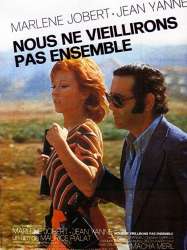
We Won't Grow Old Together (1972)
, 1h46Directed by Maurice Pialat
Origin France
Genres Drama, Romance
Actors Jean Yanne, Marlène Jobert, Harry-Max, Macha Méril, Christine Fabréga, Jacques Galland
Jean, qui est réalisateur, vit avec sa femme Françoise, mais depuis plusieurs années, il réside le plus souvent chez sa maîtresse Catherine (Colette, dans le livre). Pour des raisons professionnelles (tournage d’un film), Jean propose à Catherine de l’accompagner en Camargue, afin qu’elle assure la prise de son. La conduite de Jean est odieuse et après une scène inqualifiable, ils se réconcilient cependant, avant de rentrer à Paris. Ainsi commence un cycle invivable de disputes suivies de réconciliations. Elle s’enfuit en province, chez sa grand-mère, mais ne pouvant vivre sans elle, il la rejoint. Alors qu’il s’attache de plus en plus, elle prend un chemin opposé qui lui fait refuser tout ce qu’elle acceptait jusqu’à maintenant. La rupture intervient peu après qu’il lui propose de se marier. Catherine a décidé d’épouser un autre homme. Une dernière entrevue lui donne quelques explications.
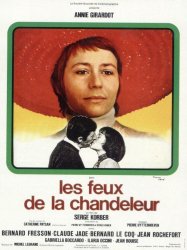
Hearth Fires (1972)
, 1h35Directed by Serge Korber, Alain Nauroy
Origin France
Genres Drama
Actors Annie Girardot, Claude Jade, Jean Rochefort, Bernard Le Coq, Bernard Fresson, Ilaria Occhini
Marie-Louise (Anne Giradot) is a woman whose love for her ex-husband will not die. The Lawyer Alexandre (Jean Rochefort) left her, because she attended a few leftist marches and demonstrations. While her daughter Laura (Claude Jade) falls in love with Marc (Bernard Fresson), Marie-Louise keeps hoping that Alexandre will come back to her. Laura helps her to fight for love and Marie-Louise is so attached to this idea that when her son (Bernard Le Coq) finally convinces her that he will never return, the realization has dire consequences.
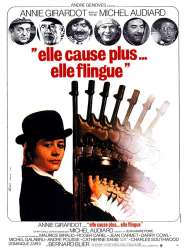
Directed by Michel Audiard
Origin France
Genres Comedy, Crime
Actors Annie Girardot, Bernard Blier, Maurice Biraud, Roger Carel, Jean Carmet, Darry Cowl
La « princesse » d'un bidonville de Champigny-sur-Marne, à l'aide de ses serviteurs dignes d'une cour des miracles recycle, dans une machine qui joue une samba, tous ceux qui lui tombent entre les mains. Leurs os servent ensuite parfois de « saintes reliques » aux autorités ecclésiastiques.
 Connection
Connection